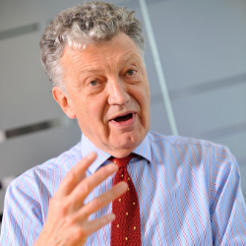The National Union of Students has this week written to Charity Commission chair William Shawcross to make clear that it already takes a robust position with regard to extremist speakers at UK universities.
It also pointed out that it has already been working with the Charity Commission and the government on the issue for many years.
Shawcross has recently used his speeches at various sector events to highlight the Commission’s increased focus on preventing charities from being corrupted by Islamic terror organisations. He has often singled out students' unions, warning that they must not allow themselves to be used as vehicles for radicalisation and that the regulator will clamp down on any that give platforms to extremist speakers.
He made the point at the Charity Law Association annual conference on Tuesday, the Commission’s own AGM on 26 September, and the Rathbones Charity Symposium on 12 September.
At the CLA event, he said that the recent Islamist attack on a shopping mall in Nairobi “where Christians were singled out to be murdered, was only the latest demonstration of the horror which the world faces”.
He also referred to the attempted murder of Labour MP Stephen Twigg in 2010 by a constituent who had been influenced by lectures from Islamic militant Anwar al-Awlaki, delivered at the Islamic societies of various universities. Shawcross described al-Awlaki as a “brilliant hatemonger” and said: “My point is that student unions should not be giving platforms to people like that.”
He said that even though “proven cases of terrorist involvement in charities are low”, the Commission “sees terrorist abuse as one of the greatest risks facing the sector today”.
NUS letter to Shawcross
Coincidentally, on Tuesday, the same day that Shawcross was making his point at the CLA Conference, the NUS was writing to him to defend its work in preventing student unions being used by extremists.
NUS national president Toni Pearce wrote: “I would like to make it clear that NUS takes a robust position in regard to extremist speakers at UK universities. Our long-established ‘no platform’ policy makes it clear that NUS will not give a number of organisations, or those representing them, a place at our events nor will be share a platform with them.
“Our ‘no platform’ policy, steeped in our longstanding anti-racism and anti-fascism work, is one we remain very proud of, and included on NUS’ current list of ‘no platform’ organisations are Hizb ut-Tharir, Al Muhajiroun, the Muslim Public Affairs Committee, the British National Party and the English Defence League.
“We have opposed and fought racism and fascism in all its forms for many decades.”
Already liaised with the Charity Commission
Pearce also pointed out that the NUS has already liaised with the Charity Commission to develop a risk-based approach to hate speakers on campus for its member students’ unions, and in 2011 produced guidance for members on managing the risks associated with external speakers.
She added that for the last five years the NUS has carried out a government-funded project to train member students’ unions in the government’s ‘Prevent’ agenda around hate speakers.
Separating personal interest from regulatory role
On Tuesday, at the CLA Conference, eminent charity lawyer Rosamund McCarthy enquired of Shawcross how he distinguishes his “personal interest” in the subject of global affairs from his role as a regulator, adding that she hoped that the Commission’s heightened focus on terrorism will be conducted in a “reasonable and proportionate way”.
Shawcross responded: “Of course we will be proportionate and behave entirely appropriately.”
The regulator recently appointed Peter Clarke, former head of counter-terrorism at the Met Police, to its board.









